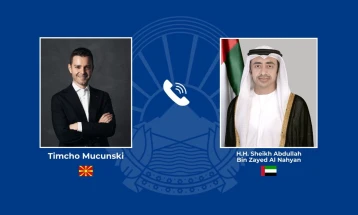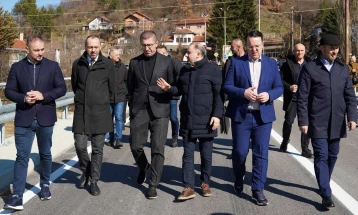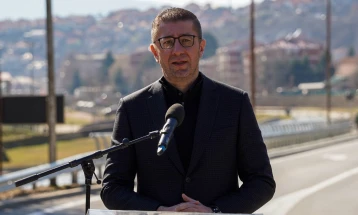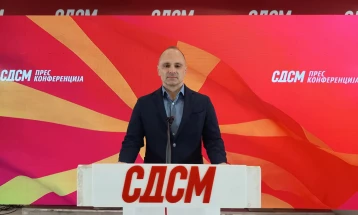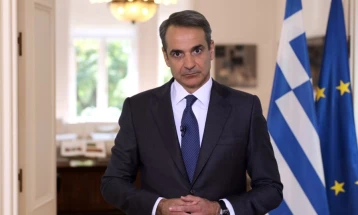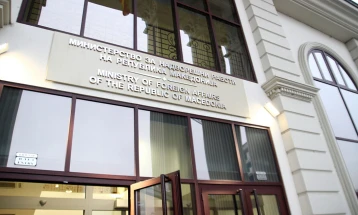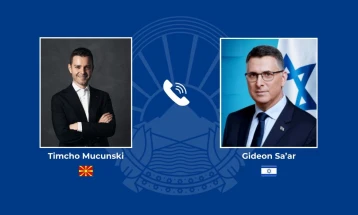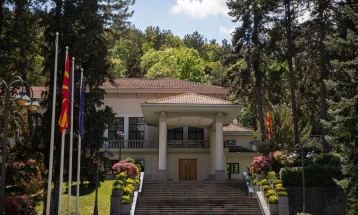Ohrid Framework Agreement marks 23rd anniversary - this year with two parallel celebrations
- The Ohrid Framework Agreement, which put an end to the conflict that lasted for several months in the country, was signed on this day 23 years ago. This year, the ruling party and the ethnic Albanian opposition will hold two parallel celebrations in Skopje to mark the event.
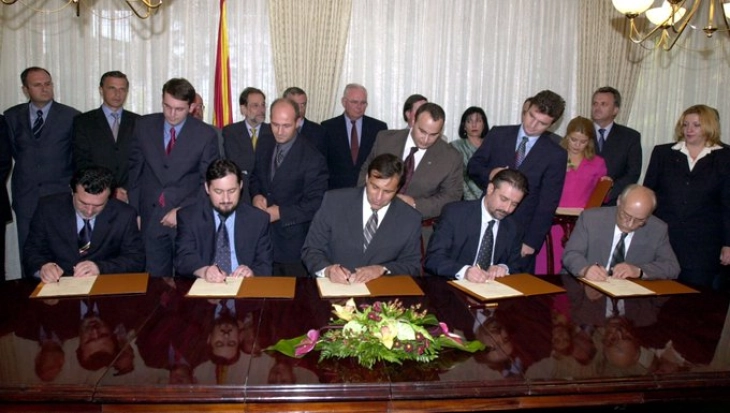
Skopje, 13 August 2024 (MIA) – The Ohrid Framework Agreement, which put an end to the conflict that lasted for several months in the country, was signed on this day 23 years ago. This year, the ruling party and the ethnic Albanian opposition will hold two parallel celebrations in Skopje to mark the event.
The Government will mark the anniversary of the Framework Agreement with a formal session at 1 pm, which is to be addressed by Prime Minister Hristijan Mickoski and First Deputy PM and Minister of Environment and Physical Planning Izet Mexhiti. The event will be broadcast live on Facebook and on the YouTube channel of the Government.
Previously, the Ministry of Environment and Physical Planning will host a panel discussion on "23 years since the Framework Agreement, decentralization remains a challenge", at the Skopje-based MPs Club at 10 am. In addition to Deputy PM Mexhiti, panellists include the Minister of Local Self-Government Zlatko Perinski and professors Rizvan Sulejmani, Nano Ruzhin, Afrim Osmani and Bujamin Bela.
Later on Tuesday, Mexhiti will host a formal reception at the Museum of Contemporary Art in Skopje.

DUI's European Front coalition announced that they will organize their own celebration to mark the 23rd anniversary of the Framework Agreement at an event titled "The Academy for Legitimacy" to be held Tuesday at noon at Skopje's Aleksandar Palace hotel.
They find it insulting that Ivan Stoiljkovic is Deputy PM and Minister responsible for the Ohrid Agreement, although he himself neither recognizes nor respects it. They also react that the budget for the Ohrid Agreement has been reduced.
"The Democratic Union for Integration cannot stand idly by when Albanians and others are humiliated daily and when every achievement in terms of equality is annulled. Therefore, we engaged the author of the Ohrid Agreement, Paul Williams, and his team to prepare a legal platform for legitimacy, with the first draft already submitted to be reviewed within the European Front, and then publicly with the academia, non-governmental organizations, media, citizens," states DUI's reaction.
Following DUI's announcement of a parallel celebration, Health Minister Arben Taravari told reporters that DUI was organizing "private parties" because they still could not accept they were the opposition.
"DUI somehow always has pretensions to privatize certain events. They still cannot accept they are the opposition, but they will get used to it in time," Minister Taravari said on Monday.
"Anyone can throw a party. We invited them to tomorrow's event, organized by the Government of the Republic of Macedonia. They are welcome, but let them continue throwing private parties," he added.
He also said historical events were never privately owned by anyone and they would always belong to the country's citizens.

On Friday, Member of Parliament Saranda Imeri from the Worth It coalition invited DUI leader Ali Ahmeti to attend the event organized by the state to mark the 23rd anniversary of the 2001 Framework Agreement.
She said there was an attempt "to privatize a bright date in Albanian history."
"Twenty-tree years ago, when the Ohrid Agreement was signed, we wrote a new chapter in the history of Macedonia," Imeri said.
"For me, as the daughter of Imer Imeri, one of the signatories of this landmark agreement, this is much more than a political document.
"It is the legacy of a generation that fought for a better future and a shared society. I am embittered to see a date that should be uniting us being used for narrow-sighted partisan interests," she said on Friday.

Following days of negotiations in Ohrid, the Ohrid Framework Agreement was signed in Skopje on August 13, 2001. Then President Boris Trajkovski, former Prime Minister and VMRO-DPMNE leader Ljubcho Georgievski, as well as SDSM, DPA and PDP leaders, Branko Crvenkovski, Arben Xhaferi and Imer Imeri respectively, signed the treaty.
EU and US special representatives, Francois Leotard and James Pardew respectively, signed the document on behalf of the international community.
In the negotiations that started in July in Skopje and then continued in Ohrid, several advisors and experts were consulted, and in certain articles issued over the years, Ali Ahmeti, who at that time led the so-called National Liberation Army (NLA), was also consulted.

More than 130 laws and amendments have been passed over the years, most of which referring to non-discrimination and just representation, identity, culture, education and power decentralization.
The Secretariat for the Implementation of the Ohrid Framework Agreement, a government institution in charge with the agreement, was set up, which was later transformed into the Ministry of Political System and Inter-Community Relations.

The basic principles of the Ohrid Agreement state that “the use of violence in pursuit of political aims is rejected completely and unconditionally.”
“Only peaceful political solutions can assure a stable and democratic future for Macedonia. Macedonia’s sovereignty and territorial integrity, and the unitary character of the State are inviolable and must be preserved. There are no territorial solutions to ethnic issues. The multi-ethnic character of Macedonia’s society must be preserved and reflected in public life. A modern democratic state in its natural course of development and maturation must continually ensure that its Constitution fully meets the needs of all its citizens and comports with the highest international standards, which themselves continue to evolve. The development of local self-government is essential for encouraging the participation of citizens in democratic life, and for promoting respect for the identity of communities,” the document states.
Photo: MIA archive
